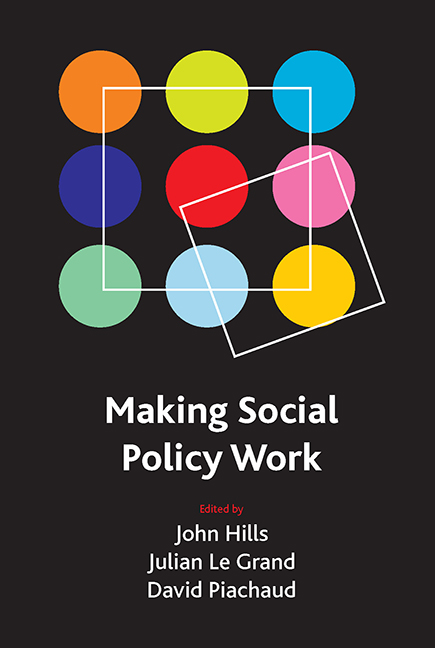Book contents
- Frontmatter
- Contents
- List of tables and figures
- Acknowledgements
- Notes on contributors
- one Introduction
- Part One The aims of social policy
- Part Two Delivering social policy
- Part Three Redistribution: between households; over time; between areas
- Appendix: Bibliography of Howard Glennerster’s publications
- Index
four - Families, individuals and the state
Published online by Cambridge University Press: 09 September 2022
- Frontmatter
- Contents
- List of tables and figures
- Acknowledgements
- Notes on contributors
- one Introduction
- Part One The aims of social policy
- Part Two Delivering social policy
- Part Three Redistribution: between households; over time; between areas
- Appendix: Bibliography of Howard Glennerster’s publications
- Index
Summary
‘The family’ is difficult territory for policy makers. There is little consensus on what it should look like these days and politicians in particular often find themselves on dangerous ground if they make judgements about sexual morality or particular forms of intimate relationships. Yet families have always been the most important provider of welfare for young and old dependants and governments have long been concerned about, or have taken for granted, what they are able and willing to do. Family policy issues have reached the top of the policy agenda over the last decade in most western European Union (EU) member states: how can fertility be increased, the welfare of children best be secured, the old looked after, and the labour market participation rates of adults increased? These are all pressing social issues, but they represent policy aims that are not necessarily easy to reconcile with each other – for example, increasing participation rates, particularly of women, may help to address child poverty as much as economic growth, but carework for children and older dependants may require an adult to be present in the home. Furthermore, family and personal life are still very much a private matter in the sense that there remains a boundary between state and family, even if changing cultural practices, including the use of mobile telephones and watching ‘reality’ television, have made much that was considered private public. The interests of different types and groups of families, and of individual family members, differ, and the choices they make may not be compatible. Thus the scope and nature of intervention by liberal democratic states is a delicate matter and subject to fierce debate.
The first two parts of this chapter tease out these tensions and examine why family issues are so difficult for policy to tackle, by outlining changes in the normative understandings of family which underpin policies, in terms of changes in family form and how men and women contribute to families. The assumptions made by policy makers about the contributions that adult family members should make have changed dramatically, in large part in response to behavioural change, especially women's increased employment rates, but also in line with government's economic priorities.
- Type
- Chapter
- Information
- Making Social Policy WorkEssays in honour of Howard Glennerster, pp. 59 - 84Publisher: Bristol University PressPrint publication year: 2007



